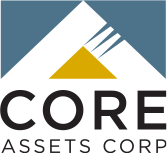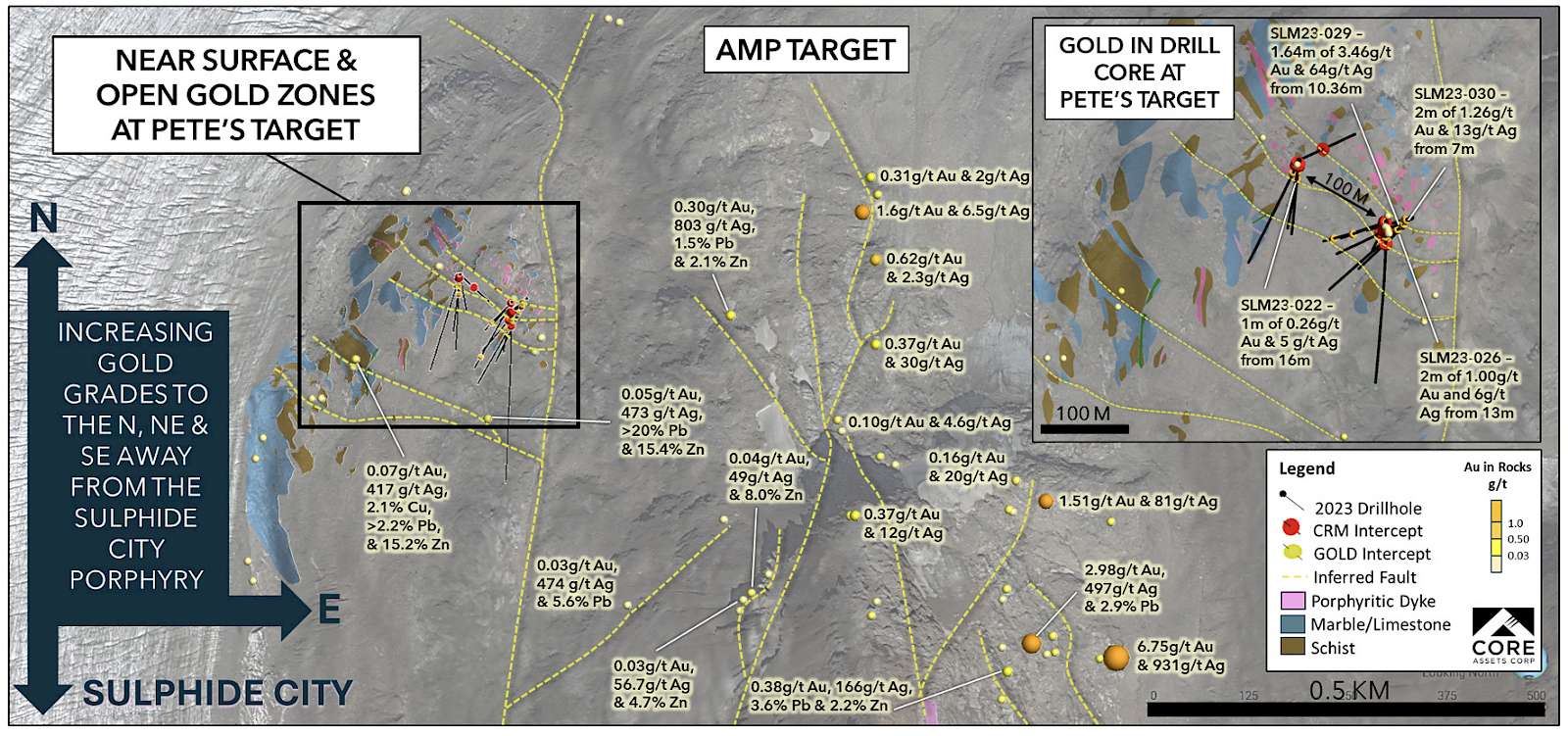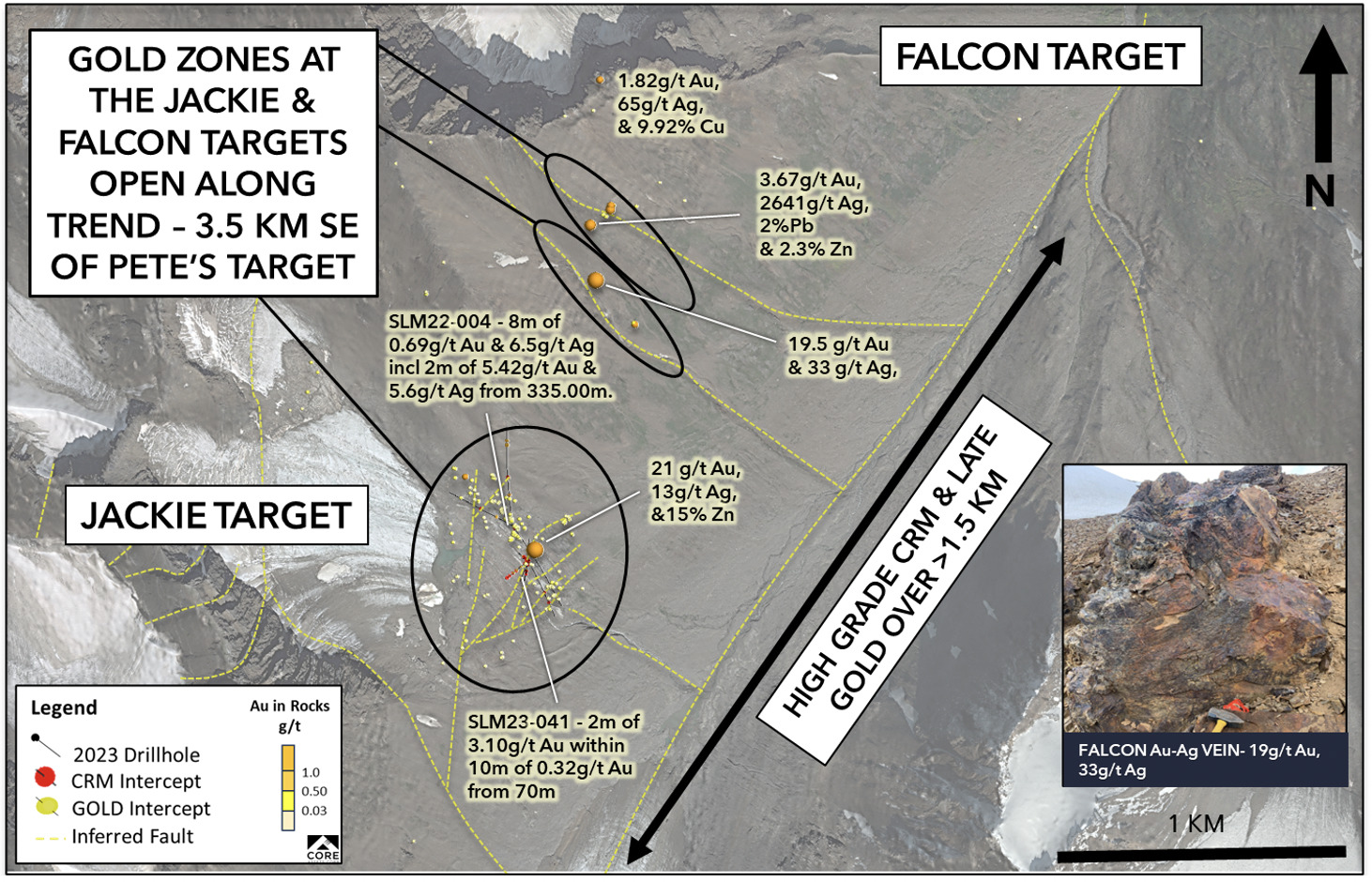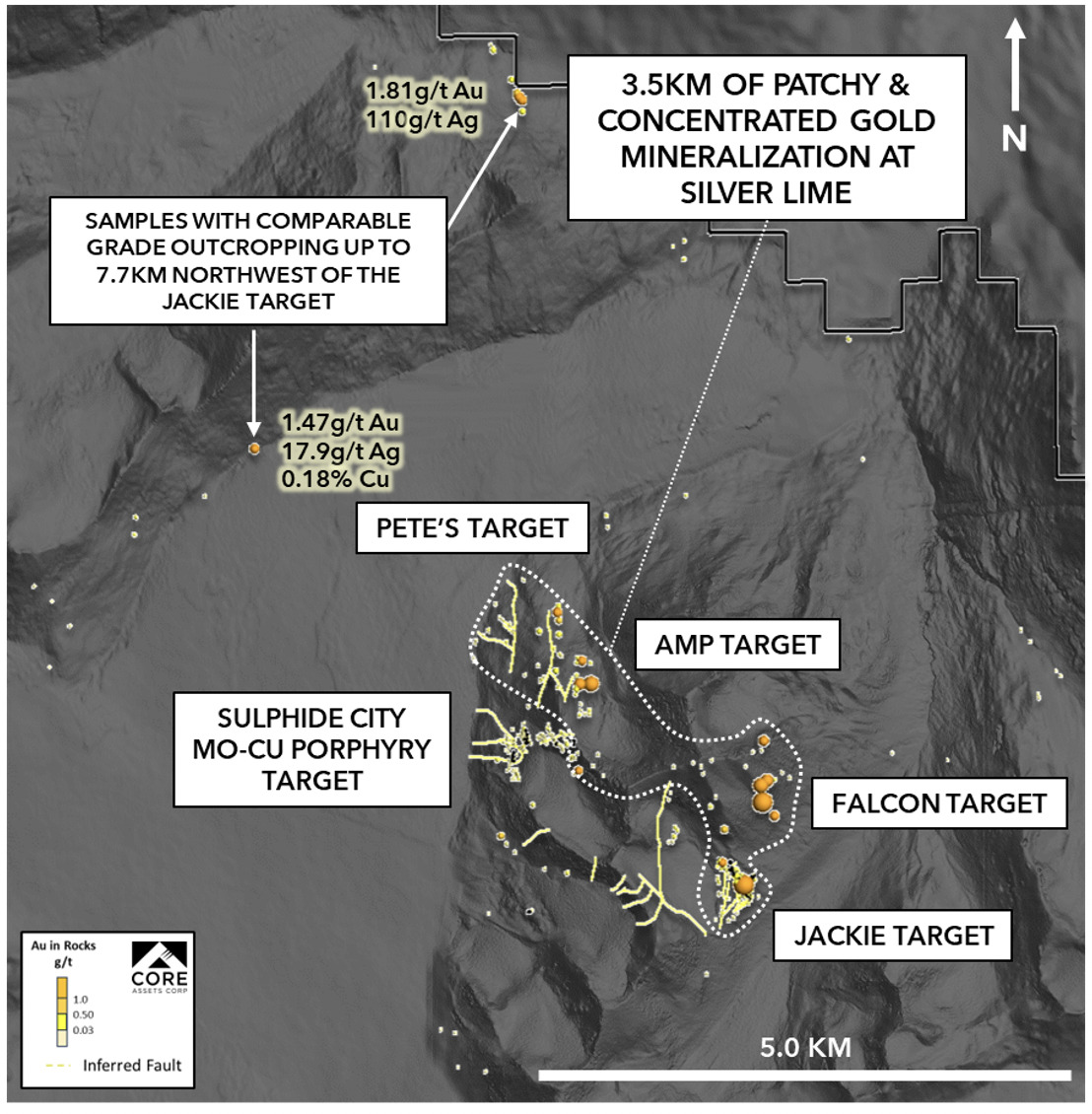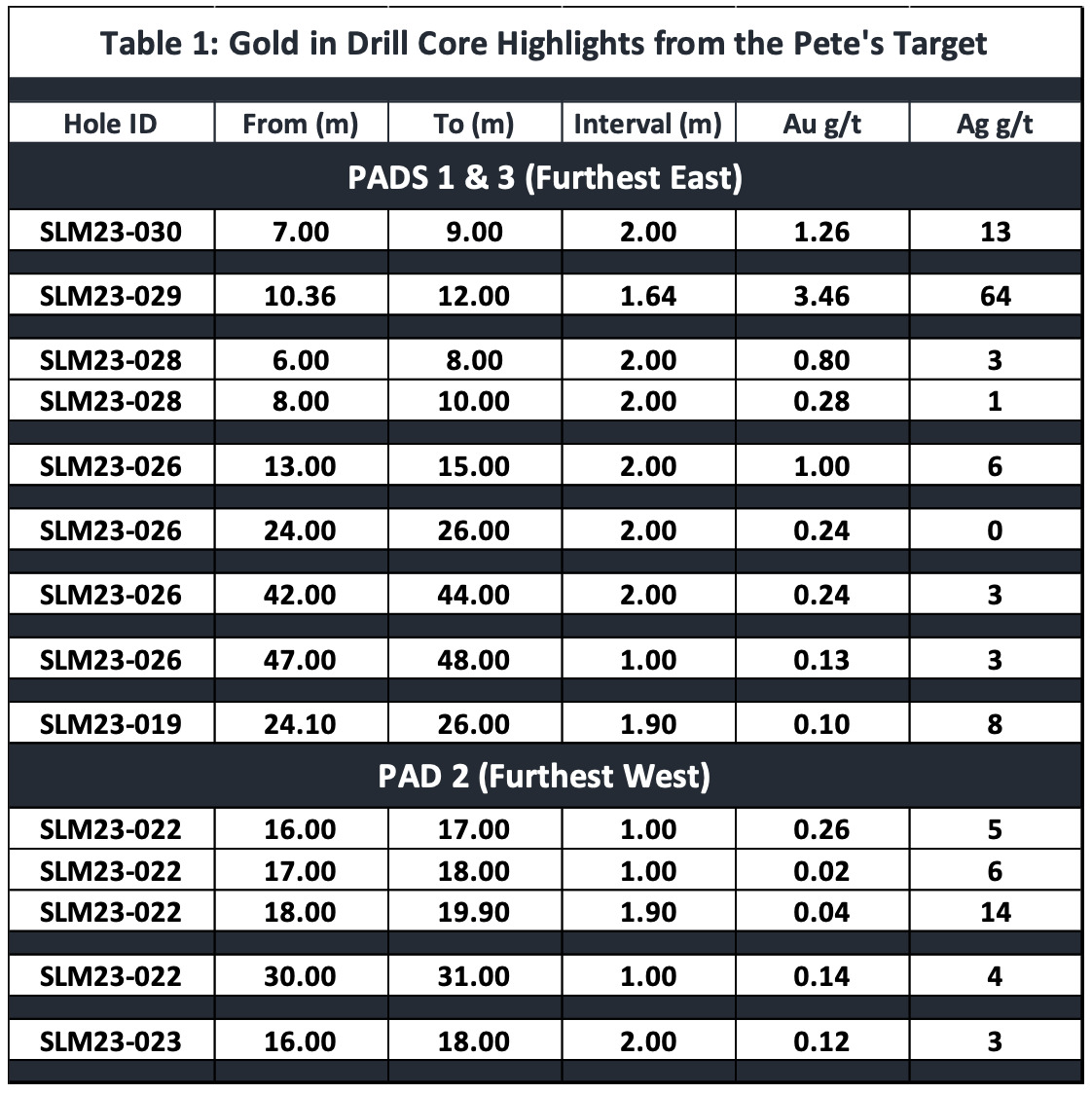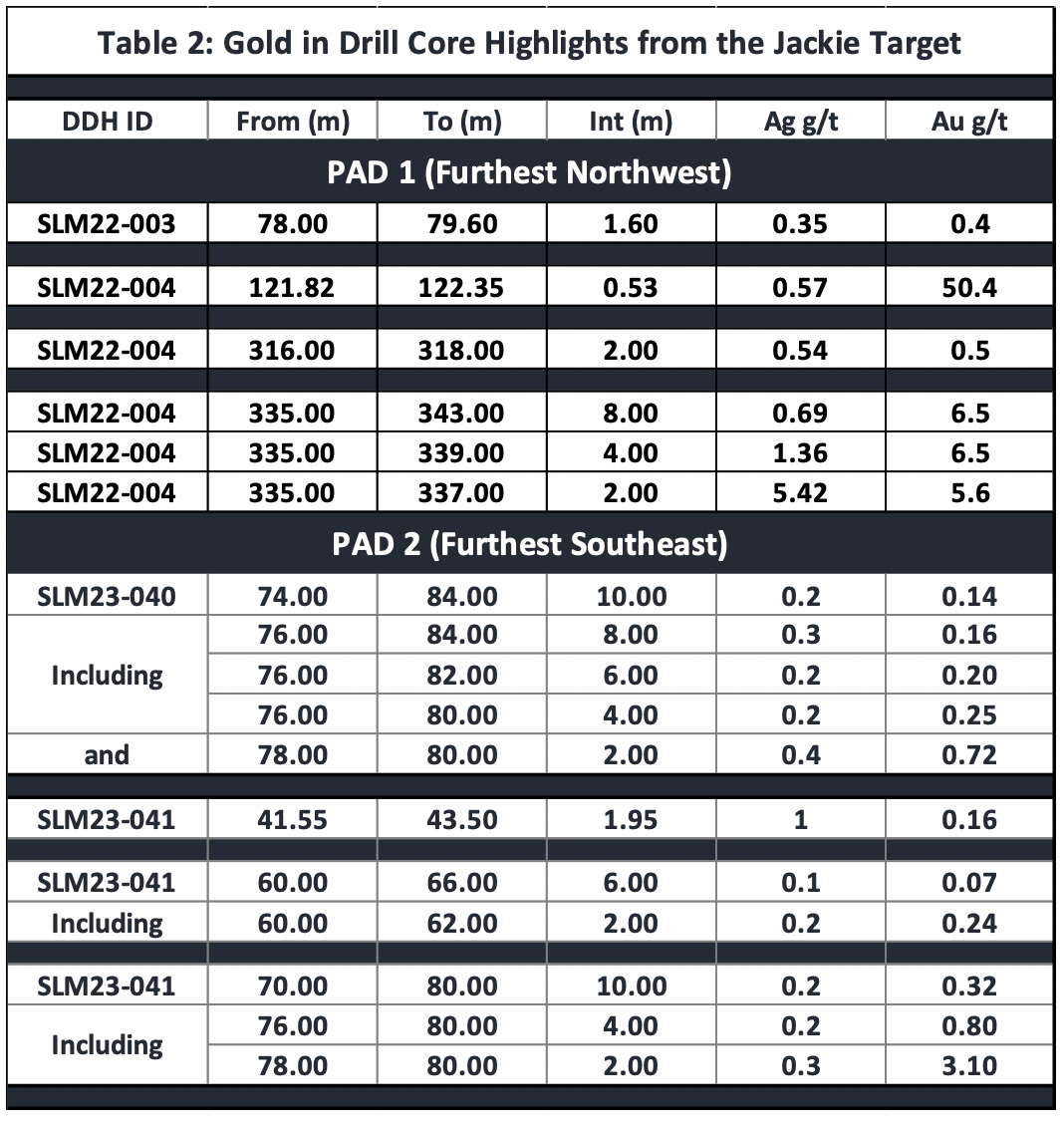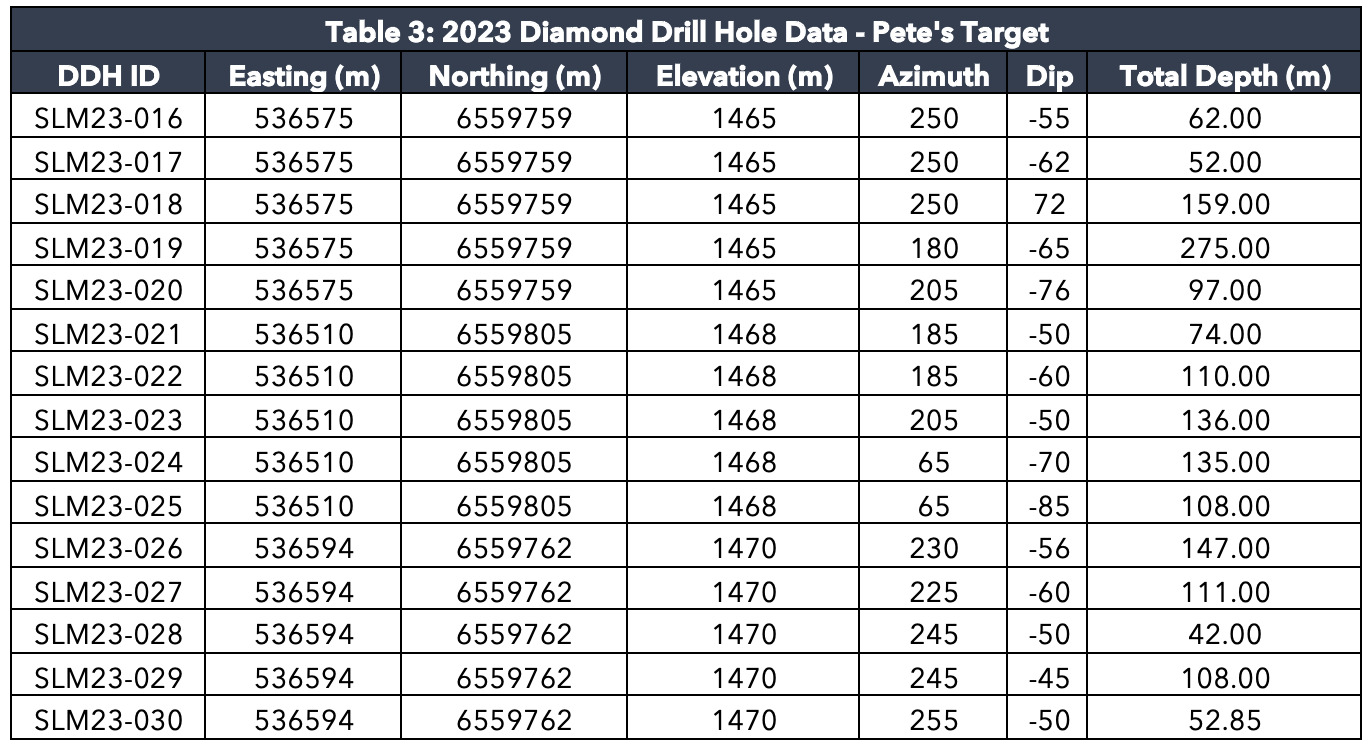Vancouver, March 5, 2024 – Core Assets Corp., (“Core Assets” or the “Company”) (CSE:CC) (FSE:5RJ) (OTC.QB:CCOOF) is pleased to present gold assay results from the Silver Lime CRD-Porphyry Project (the “Silver Lime Project” or “Silver Lime”), central Blue Property (the “Blue Property”), Atlin Mining District of NW British Columbia.
Exploration work completed outboard of the Sulphide City Porphyry has uncovered late-stage gold mineralization at Silver Lime. Significant gold grades have already been observed at the Pete’s, Amp, Falcon, and Jackie targets in areas coincident with massive sulphide mineralization - adding to the endowment of our high-grade skarn and carbonate replacement targets. Gold mineralization at Silver Lime appears to be hosted in late fugitive calcite veins stemming from steeply dipping fault splays that affect schist, marble, local porphyritic dykes, and zones of massive sulphide. It is interpreted that late gold-bearing fluids utilized the same structural pathways that focused the earlier massive sulphide-bearing ore-fluids, making these newly discovered, steep conduits excellent drill targets for both high-grade massive sulphide and late gold mineralization. Surface samples with comparable gold and silver grades to those at Silver Lime have also been discovered in massive sulphide and quartz-carbonate veins regionally – 7.7 kilometers to the northwest of the Jackie Target.
Pete’s & Amp Target Highlights (Table 1)
- SLM23-030 intersected 2m of 1.26g/t Au and 13g/t Ag from 7m depth.
- SLM23-029 intersected 1.64m of 3.46g/t Au and 64g/t Ag from 10.36m depth.
- SLM23-028 returned 2m of 0.80g/t Au and 3g/t Ag within 4m of 0.28g/t Au from 6m depth.
- SLM23-026 intersected 2m of 1.00g/t Au and 6g/t Ag from 13m depth.
- This gold-bearing zone was also intersected at Drill Pad 2, located 100m west of the holes listed above, and graded up to 0.26g/t Au and 14g/t Ag over narrow intervals.
- Gold in quartz-carbonate veinlets with sulphides at the AMP Target, located almost a kilometer southeast of Pete’s, grade up to 6.75g/t Au and 931g/t Ag.
- Gold occurrences at Pete’s and Amp are localized along NW-SE trending faults stemming from a larger, >1.2-kilometer-long, gold-bearing fault zone located between the two targets (Figure 1).
Jackie & Falcon Target Highlights (Table 2)
- SLM22-004 intersected 8m of 0.69g/t Au and 6.5g/t Ag including 2m of 5.42g/t Au and 5.6g/t Ag from 335m.
- SLM23-041 (and SLM23-040) intersected multiple Au-bearing zones including 2m of 3.10g/t Au within 10m of 0.32g/t Au from 70m.
- SLM22-003 returned 1.6m of 0.35g/t Au from 78m depth. This intercept forms an ~200m long gold trend outlined with 2023 drilling (SLM23-040 and 041) along a schist-marble contact.
- The two best gold-bearing surface samples collected to-date were discovered at the Falcon and Jackie targets. Historic Sample 89868 (Carmac, 1990) at Jackie graded 21g/t Au, 12g/t Ag, and 15% Zn (+As-Cu-Sb), whereas sample D935063 collected by Core Assets at Falcon in 2022 returned 19.5g/t Au and 33g/t Ag from coarse quartz-carbonate veins measuring up to 2m wide (Figure 2)
- Gold occurrences at Jackie and Falcon are also observed along multiple NW-SE trending faults stemming from a larger, >1.5-kilometer-long fault zone located immediately to the east (Figure 2).
Porphyritic dykes proximal to gold-bearing faults appear closely associated with late gold mineralization, as well as earlier massive sulphide carbonate replacement mineralization. These intrusions locally carry a similar metal (As-Sb-Ba-Tl) signature to other gold-bearing zones sampled at Silver Lime. These gold zones outcrop in clusters over 3.5-kilometer area outboard of the Sulphide City Mo-Cu Porphyry and remain open for exploration in all directions (Figure 3).
Core Assets’ President & CEO Nick Rodway commented, “We are thrilled to have intersected gold-rich zones at the Silver Lime Porphyry-CRD Project. We continue to uncover evidence for a district-scale example of the full mineralization spectrum from the Mo+Cu Porphyry Hub at Sulphide City, through Zn-Pb-Ag-Cu massive sulphide, and distal/late gold. In 2023, multiple shallowly dipping drillholes intersected these steep gold-rich conduits. These gold zones remain open for exploration, and we look forward to providing continued updates as we prepare for our fully funded 2024 exploration program.”
Figure 1: Simplified Plan Map of the Pete’s & Amp targets highlighting 2023 drilling assay results at Pete’s (CRM Intercepts and gold-bearing intercepts) as well as the distribution of gold in surface samples and their correlation to mapped mineralized structures outboard and North of the Sulphide City Porphyry. Target structures or “spokes” (highlighted in yellow) acted as pathways for ore fluids that continuously evolved from Zn to Ag to Au-bearing while utilizing the same pathways.
Figure 2: Simplified Plan Map of the Jackie and Falcon targets highlighting the distribution of gold in surface samples and their correlation to mapped mineralized structures outboard of the Sulphide City Porphyry at the Jackie & Falcon targets. Target structures or “spokes” (highlighted in yellow) acted as pathways for ore fluids that continuously evolved from Zn to Ag to Au-bearing while utilizing the same pathways.
Figure 3: The distribution of Au at surface within the 9.5 x 10 km2 mineralized footprint at the Silver Lime Project.
*Assay results are presented as uncut weighted averages. Interval widths represent drilled HQ core lengths and true width is unknown currently.
*Assay results are presented as uncut weighted averages. Interval widths represent drilled HQ core lengths and true width is unknown currently.
About the Silver Lime CRD-Porphyry Project
The Silver Lime Project is predominantly hosted in carbonate rocks of the Florence Range Metamorphic Suite (ca. 1150Ma). Target limestone and marble host rocks are intercalated with upper amphibolite grade metapeltic rocks, quartzite, and amphibole-bearing gneiss. The protoliths to the metasedimentary units include continentally derived clastic strata and platform carbonate, whereas the amphibole-bearing gneiss is interpreted as probable basaltic flows, sills, dykes, and tuffaceous units related to early rifting of the ancestral North America continental margin (i.e., Mihalynuk, 1999). Younger felsic to intermediate intrusive rocks are also widespread within the project area and range from Triassic to Eocene in age. Widespread Eocene magmatic activity was associated with Cordillera-wide, brittle strike-slip faulting. Eocene volcano-plutonic centres in the western Cordillera are known to host porphyry, skarn, and epithermal-type mineralization extending from the Golden Triangle in NW British Columbia to the Tally-Ho Shear Zone in the Yukon (>100 kilometers).
A total of 5,565 metres of exploratory diamond drilling was completed at the Silver Lime CRD-Porphyry Project during the Company’s inaugural drilling campaign in 2022. First-pass drilling successfully confirmed the presence of high-grade Ag-Pb-Zn-Cu carbonate replacement (CRD) mineralization at depth, as well as widespread porphyry Mo mineralization and associated mineralized skarn.
The explored extent of the Silver Lime CRD-Porphyry Project currently measures 10KM by 9.5KM and boasts an average surficial grade of 83g/t Ag, 0.22% Cu, 1.8% Pb, 3.4% Zn, and 0.16g/t Au (700 samples). High-grade carbonate replacement mineralization has been observed in folded marble host rocks ranging up to 250-meters-thick. In 2022, Ag-Zn-Pb-Cu-bearing mineralization was intersected near the bottom of Sulphide City hole SLM22-006 near 453 meters depth.
Currently, the Silver Lime Project consists of 7 highly prospective targets that span the complete mineralization spectrum from Porphyry Mo-Cu to Fe-Zn-Cu-Ag massive sulphide skarn (Sulphide City) and Ag-Pb-Zn-Cu-Au carbonate replacement mineralization (Gally, Pete’s, Grizzly, Jackie), to distal, sediment-hosted Ag-Au bearing quartz veining and Au-bearing base metal sulphide vein occurrences (Amp, Falcon). Prospecting and surface sampling in 2022 more than doubled the number of exposed, high-grade carbonate replacement massive sulphide targets at Silver Lime that remain open in all directions and at depth.
Sampling Protocol, Quality Assurance & Quality Control
All recovered drill core was transported by helicopter to the core logging facility in Atlin, British Columbia for processing. Down hole surveys were conducted on all drill holes upon termination, using a Reflex Gyro Sprint downhole survey tool equipped with an azimuth positioning capability. Drill core was typically sampled over two-meter intervals and occasionally reduced in areas of higher visual sulphide mineralization. Core samples were cut in half with an electric core saw, bagged, labelled, sealed, and submitted to ALS Minerals preparation facility in Whitehorse, YT with the remaining core stored in Atlin, BC. Half core samples were finely crushed and sieved to <75 microns. Samples were then shipped to ALS Geochemistry in North Vancouver, British Columbia where they were analysed for Au by fire assay with an AA finish, over limits for Ag, Pb Cu, and Zn and additional elements were analysed using four acid digestion with an ICP-AES or ICP-MS finish, In some cases, gravimetric separation was used to determine and compare Ag overlimit assays.
Blank rock (siliceous river rock), duplicate, and certified reference materials were inserted into the sample stream for at least every 20 samples. Certified reference materials were acquired from OREAS North America Inc. of Sudbury, Ontario and CDN Resource Laboratories Ltd. of Langley, British Columbia for the 2023 diamond drilling campaign.
National Instrument 43-101 Disclosure
Nicholas Rodway, P.Geo, (Licence# 46541) (Permit to Practice# 100359) is President, CEO and Director of the Company, and qualified person as defined by National Instrument 43-101- Standards of Disclosure for Mineral Projects. Mr. Rodway has reviewed and approved the technical content in this release.
About Core Assets Corp.
Core Assets Corp. is a Canadian mineral exploration company focused on the acquisition and development of mineral projects in British Columbia, Canada. The Company currently holds 100% ownership in the Blue Property, which covers a land area of 114,074 hectares (~1,140 km²). The project lies within the Atlin Mining District, a well-known gold mining camp located in the unceded territory of the Taku River Tlingit First Nation and the Carcross/Tagish First Nation. The Blue Property hosts a major structural feature known as The Llewellyn Fault Zone (“LFZ”). This structure is approximately 140 km in length and runs from the Tally-Ho Shear Zone in the Yukon, south through the Blue Property to the Alaskan Panhandle Juneau Ice Sheet in the United States. Core Assets believes that the south Atlin Lake area and the LFZ has been neglected since the last major exploration campaigns in the 1980's. The LFZ plays an important role in mineralization of near surface metal occurrences across the Blue Property. The past 50 years have seen substantial advancements in the understanding of porphyry, skarn, and carbonate replacement type deposits both globally and in British Columbia’s Golden Triangle. The Company has leveraged this information at the Blue Property to tailor an already proven exploration model and believes this could facilitate a major discovery. Core Assets is excited to become one of Atlin Mining District’s premier explorers where its team believes there are substantial opportunities for new discoveries and development in the area.
On Behalf of the Board of Directors
CORE ASSETS CORP.
“Nicholas Rodway”
President & CEO
Tel: 604.681.1568
Neither the Canadian Securities Exchange nor its Regulation Services Provider (as that term is defined in the policies of the CSE) accepts responsibility for the adequacy or accuracy of this release.
FORWARD LOOKING STATEMENTS
Statements in this document which are not purely historical are forward-looking statements, including any statements regarding beliefs, plans, expectations, or intentions regarding the future. Forward looking statements in this news release include, but are not limited to, expectations regarding the pending core assays, including speculative inferences about potential copper, molybdenum, gold, silver, zinc, and lead grades based on preliminary visual observations from results of diamond drilling at the Silver Lime Project and the Laverdiere Project, as applicable; the Company’s plans to further investigate the geometry and extent of the skarn and carbonate replacement type mineralization continuum at the Silver Lime Project through additional field work and diamond drilling and any planned or proposed program related thereto; and any other general statement regarding the Company’s planned or future exploration efforts at the Blue Property. It is important to note that the Company's actual business outcomes and exploration results could differ materially from those in such forward-looking statements. Risks and uncertainties include that expectations regarding pending core assays based on preliminary visual observations from diamond drilling results at the Silver Lime Project and the Laverdiere Project, as applicable, may be found to be inaccurate; that results may indicate further exploration efforts at the Silver Lime Project and the Laverdiere Project, as applicable, as not warranted; that the Company may be unable to implement its plans to further explore at the Silver Lime Project and the Laverdiere Project, as applicable; that certain exploration methods, including the Company’s proposed exploration model for the Blue Property, may be ineffective or inadequate in the circumstances; that economic, competitive, governmental, geopolitical, environmental and technological factors may affect the Company's operations, markets, products and prices; our specific plans and timing drilling, field work and other plans may change; that the Company may not have access to or be able to develop any minerals because of cost factors, type of terrain, or availability of equipment and technology; and we may also not raise sufficient funds to carry out or complete our plans. The ongoing COVID-19 pandemic, labour shortages, inflationary pressures, rising interest rates, the global financial climate and the conflict in Ukraine and surrounding regions are some additional factors that are affecting current economic conditions and increasing economic uncertainty, which may impact the Company’s operating performance, financial position, and prospects. Collectively, the potential impacts of this economic environment pose risks that are currently indescribable and immeasurable. No assurance can be given that any of the events anticipated by the forward-looking statements will occur or, if they do occur, what benefits the Company will obtain from them. Readers are cautioned that forward-looking statements are not guarantees of future performance or events and, accordingly, are cautioned not to put undue reliance on forward-looking statements due to the inherent uncertainty of such statements. Additional risk factors are discussed in the section entitled “Risk Factors” in the Company's Management Discussion and Analysis for its recently completed fiscal period, which is available under the Company's SEDAR profile at www.sedar.com. Except as required by law, the Company will not update or revise these forward-looking statements after the date of this document or to revise them to reflect the occurrence of future unanticipated events.
